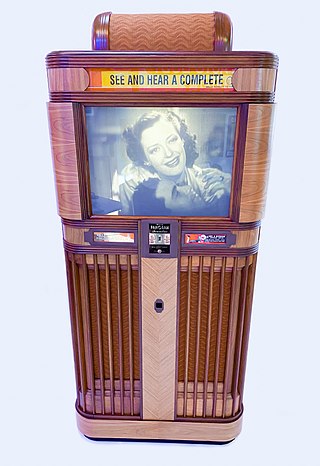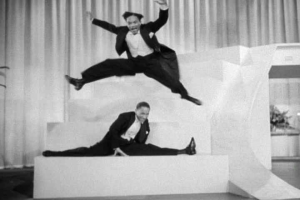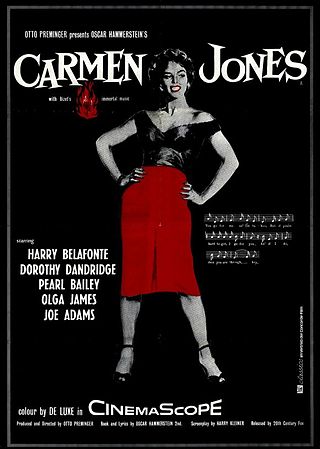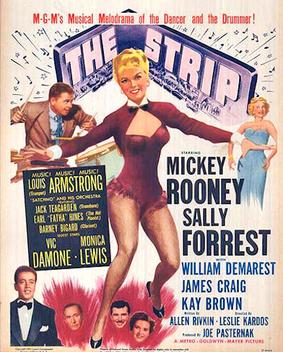
Dorothy Jean Dandridge was an American actress and singer. She was the first African-American film star to be nominated for the Academy Award for Best Actress for Carmen Jones (1954). Dandridge had also performed as a vocalist in venues such as the Cotton Club and the Apollo Theater. During her early career, she performed as a part of the Wonder Children, later the Dandridge Sisters, and appeared in a succession of films, usually in uncredited roles.

A soundie is a three-minute American musical film displaying a performance. Soundies were produced between 1940 and 1946 and have been referred to as "precursors to music videos". Soundies exhibited a variety of musical genres in an effort to draw a broad audience. The shorts were originally viewed in public places on "Panorams": coin-operated, 16mm rear projection machines. Panorams were typically located in businesses like nightclubs, bars, and restaurants. Due to World War II, Soundies also featured patriotic messages and advertisements for war bonds. Hollywood films were censored but Soundies weren't, so the films occasionally had daring content like burlesque acts; these were produced to appeal to soldiers on leave.

The Nicholas Brothers were an entertainment act composed of brothers, Fayard (1914–2006) and Harold (1921–2000), who excelled in a variety of dance techniques, primarily between the 1930s and 1950s. Best known for their unique interpretation of a highly acrobatic technique known as "flash dancing", they were also considered by many to be the greatest tap dancers of their day, if not all time. Their virtuoso performance in the musical number "Jumping' Jive" featured in the 1943 movie Stormy Weather has been praised as one of the greatest dance routines ever captured on film.

Harold Lloyd Nicholas was an American dancer specializing in tap. Nicholas was the younger half of the tap-dancing pair the Nicholas Brothers, known as two of the world's greatest dancers. His older brother was Fayard Nicholas. Nicholas was featured in such musicals as An All-Colored Vaudeville Show (1935), Stormy Weather (1943), The Pirate (1948), and The Five Heartbeats (1991).

Cabin in the Sky is a 1943 American musical film based on the 1940 Broadway musical of the same name. The first feature film directed by Vincente Minnelli, Cabin in the Sky features an all-black cast and stars Ethel Waters, Eddie "Rochester" Anderson and Lena Horne. Waters and Rex Ingram reprise their roles from the Broadway production as Petunia and Lucifer Junior, respectively. The film was Horne's first and only leading role in an MGM musical. Louis Armstrong is also featured in the film as one of Lucifer Junior's minions, and Duke Ellington and his Orchestra have a showcase musical number in the film.
The Our Gang personnel page is a listing of the significant cast and crew from the Our Gang short subjects film series, originally created and produced by Hal Roach which ran in movie theaters from 1922 to 1944.

Introducing Dorothy Dandridge is a 1999 American biographical drama television film directed by Martha Coolidge and written by Shonda Rhimes and Scott Abbott, based on the 1991 biography Dorothy Dandridge by Earl Mills. Filmed over a span of a few weeks in early 1998, the film stars Halle Berry as actress and singer Dorothy Dandridge and premiered on HBO on August 21, 1999. The original music score was composed by Elmer Bernstein, who had known Dandridge and Otto Preminger.

John Elmer Carson, known as Jack Carson, was a Canadian-born American film actor. Carson often played the role of comedic friend in films of the 1940s and 1950s, including The Strawberry Blonde (1941) with James Cagney and Arsenic and Old Lace (1944) with Cary Grant. He appeared in such dramas as Mildred Pierce (1945), A Star is Born (1954), and Cat on a Hot Tin Roof (1958). He worked for RKO and MGM, but most of his notable work was for Warner Bros.

Sensations of 1945 is a 1944 American musical-comedy film directed by Andrew Stone and starring Eleanor Powell. Released by United Artists, the film was an attempt to recapture the ensemble style of films such as Broadway Melody of 1936 by showcasing a number of top musical and comedy acts of the day, in a film linked together by a loose storyline. Sensations of 1945 stars dancer Powell and Dennis O'Keefe as two rival publicists who fall in love, but the film's main purpose is to showcase a variety of different acts, ranging from tightrope walking to comedy to Powell's athletic tap dancing. The rollicking supporting cast features W.C. Fields in his final role the year before his death, C. Aubrey Smith, Eugene Pallette, dancer David Lichine, Lyle Talbot, Sophie Tucker, jazz pianist Dorothy Donegan, Cab Calloway, Woody Herman, jazz pianist/composer Gene Rodgers, and Les Paul.

Follow the Boys also known as Three Cheers for the Boys is a 1944 musical film made by Universal Pictures during World War II as an all-star cast morale booster to entertain the troops abroad and the civilians at home. The film was directed by A. Edward "Eddie" Sutherland and produced by Charles K. Feldman. The movie stars George Raft and Vera Zorina and features Grace McDonald, Charles Grapewin, Regis Toomey and George Macready. At one point in the film, Orson Welles saws Marlene Dietrich in half during a magic show. W.C. Fields, in his first movie since 1941, performs a classic pool-playing presentation he first developed in vaudeville four decades earlier in 1903.

Carmen Jones is a 1954 American musical film featuring an African American cast starring Harry Belafonte, Dorothy Dandridge, and Pearl Bailey and produced and directed by Otto Preminger. The screenplay by Harry Kleiner is based on the lyrics and book by Oscar Hammerstein II, from the 1943 stage musical of the same name, set to the music of Georges Bizet's 1875 opera Carmen. The opera was an adaptation of the 1845 Prosper Mérimée novella Carmen by Henri Meilhac and Ludovic Halévy.

Vivian Alferetta Dandridge was an American singer, actress and dancer. Dandridge is best known for being the older sister of actress and singer Dorothy Dandridge and the daughter of actress Ruby Dandridge. Dandridge was a member of the Dandridge Sisters musical group, along with Etta Jones and Dorothy Dandridge from 1934 until the group disbanded in 1940. Dandridge went on to appear in minor roles on films and television from 1940 through the early 1960s. She never really achieved the same notable success as her younger sister, and Vivian Dandridge disappeared from the public eye by 1970. Dandridge died after suffering a stroke on October 26, 1991, at age 70.
The Dandridge Sisters were an American all-girl singing trio, started in 1934 in Los Angeles, California, and ended in 1940, comprising the sisters Vivian and Dorothy Dandridge together with their friend Etta Jones. They had a short period of fame traveling around the United States performing for night clubs, theatres, radio shows, and eventually left the U.S. to tour in Europe. Dorothy Dandridge decided to become a solo artist, the band split, and each woman then pursued projects individually.
Raymond Benedict McCarey was an American film director, brother of director Leo McCarey.

This is a selection of films and television appearances by British-American comedian and actor Bob Hope (1903-2003). Hope, a former boxer, began his acting career in 1925 in various vaudeville acts and stage performances

The Regal Theater was a night club, theater, and music venue, popular among African Americans, located in the Bronzeville neighborhood in Chicago, Illinois. The theater was designed by Edward Eichenbaum, and opened in February 1928. It closed in 1968 and was demolished in 1973.
Charles “Cookie” Cook was a tap dancer who performed in the heyday of tap through the 1980s, and was a founding member of the Copasetics. He was the dance partner of Ernest “Brownie” Brown, with whom he performed from the days of vaudeville into the 1960s. They performed in film, such as Dorothy Dandridge 1942 “soundie” Cow Cow Boogie, on Broadway in the 1948 musical Kiss Me, Kate, twice at the Newport Jazz Festival, as well in other acts, including “Garbage and His Two Cans” in which they played the garbage cans. He headlined venues including New York's Palace, the Apollo, Radio City Music Hall, Cotton Club, and London Palladium. Quoted as saying “if you can walk, you can dance,” Cook was one of the most influential tap masters and crucial in passing on the tap tradition to future generations.

Phil Moore was an American jazz pianist, arranger, and bandleader.

The Strip is a 1951 American crime film noir starring Mickey Rooney and Sally Forrest, with William Demarest, James Craig, and Kay Brown in support. Directed by László Kardos, the picture was shot largely on location in and around the Sunset Strip, including performances at the popular nightclubs Mocambo and Ciro's and scenes at the restaurants Little Hungary and Stripps.
Ladies of Washington is a 1944 American drama film directed by Louis King and starring Trudy Marshall, Ronald Graham and Anthony Quinn.














